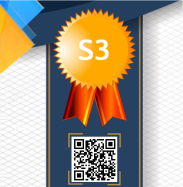ANALISIS DAMPAK PENGGUNAAN REWARD DALAM PEMBELAJARAN PENDIDIKAN AGAMA ISLAM DI SMA MUHAMMADIYAH ACEH SINGKIL
Abstract
Keywords
Full Text:
PDFReferences
Abdul Majid dan Dian Andayani, Pendidikan Agama Islam Berbasis Kompetensi “Konsep dan Implementasi Kurikulum 2004”, Bandung: PT. Remaja Rosdakarya, 2004.
Armai Arief, Pengantar Ilmu dan Metodologi Pendidikan Islam. Jakarta: Ciputat Pers, 2002.
Azyumardi Azra. “Genealogy of Indonesian islamic education: Roles in the modernization of muslim society. Heritage of Nusantara: International Journal of Religious Literature and Heritage (e-Journal), 4(1), 2015, hal. 85-114.
Azyumardi Azra, Pendidikan Islam dan Modernisasi Menuju Millennium Baru, Jakarta: Logos Wacana, 1999.
Departemen Agama Republik Indonesia, Standar Isi MA, Jakarta: Direktorat Jenderal Pendidikan Islam, 2006.
Elizabeth B. Hurlock, Perkembangan Anak, terj. Med. Meitasari Tjandrasa, Jakarta: Erlangga, 1990.
Emile Durkheim, Pendidikan Moral: Suatu Studi Teori dan Aplikasi Sosiologi pendidikan, terj. Lukas Ginting, Jakarta: Erlangga, 1990.
E. Mulyasa, Kurikulum Berbasis Kompetensi, Konsep, Karakteristik, Implementasi, Bandung: Rosdakarya, 2003.
Noemi Herranz-Zarzoso, N., & Sabater-Grande- Grande. “Monetary incentives and self-chosen goals in academic performance: An experimental study“. International Review of Economics Education, 27, 2018.
Rebecca Hewett & Neil Conway. “The undermining effect revisited: The salience of everyday verbal rewards and self‐determined motivation“. Journal of Organizational Behavior, 37(3), 2016, hal. 436-455.
Suzanne Hidi. “Revisiting the role of rewards in motivation and learning: Implications of neuroscientific research“. Educational Psychology Review, 28(1), 2016, hal. 61-93.
Ikranagara, P. (2015). Pemberian Reward Dan Punishment Untuk Meningkatkan Kedisiplinan Siswa Dalam Pembelajaran IPS Kelas V SD Negeri 1 Kejobong Purbalingga. BASIC EDUCATION, 4(2).
Lampiran Peraturan Menteri Pendidikan Nasional Nomor 23 Tahun 2006 Tanggal 23 Mei 2006, Standar Kompetensi dan Kompetensi Dasar, Jakarta: Puskur, 2007.
Edwin Leuven, Hessel Oosterbeek & Bas Van der Klaauw. ”The effect of financial rewards on students' achievement: Evidence from a randomized experiment.“ Journal of the European Economic Association, 8(6), 2010, hal, 1243-1265.
Lexy J. Moleong, Metodologi Penelitian Kualitatif, Bandung: Remaja Rosdakarya, 2002.
Marzuki, M. “Diniyyah in Public Schools: A Model of Islamic Curriculum Implementation in Multi Religious Society in Banda Aceh-Indonesia“. Jurnal Ilmiah Peuradeun, 4(1), 2016, hal. 15-26.
Mary Go Setiawani, Menembus Dunia Anak, (Jakarta: Raja Grafindo Persada, 2000.
Ngalim Purwanto, Ilmu Pendidikan Teoritis dan Praktis. Bandung: Remaja Rosdakarya, 2007.
Rasimin dan Imam Subqi, Belajar PeDe: Kontestualisasi Reward dan Punishment dalam Pembelajaran , Yogyakarta: Mitra Cendekia, 2009.
Sabriani, S. (2013). Penerapan Pemberian Tugas Terstruktur disertai Umpan Balik pada Pembelajaran Langsung untuk Meningkatkan Motivasi dan Hasil Belajar Siswa (Studi Pada Materi Pokok Struktur Atom Kelas X6 SMA Negeri 3 Watampone). CHEMICA, 13(2), 39-46.
Saleh, Teori-Teori Pendidikan Berdasarkan Al Qur’an. Jakarta: Rineka Cipta, 2005.
Slameto, Belajar dan Faktor-Faktor Yang Mempengaruhinya, Jakarta: Rineka Cipta, 2010.
Sugiono, Prof, and Bud E. Prof. "Metode Penelitian Pendidikan, pendekatan Kuantitatif, kualitatif dan R & D." Bandung: Alfabeta, 2008.
Lexy J. Moleong, Metodologi Penelitian Kualitatif, Bandung: Remaja Rosdakarya, 2002.
Zakiyah Darajat, Ilmu Pendidikan Islam, Jakarta: Bumi Aksara, 1996.
Ramayulis, Ilmu Pendidikan Islam, Jakarta : Kalam Mulia, 1994.
DOI: http://dx.doi.org/10.22373/jid.v19i2.5031
Refbacks
- There are currently no refbacks.
except where otherwise noted.



